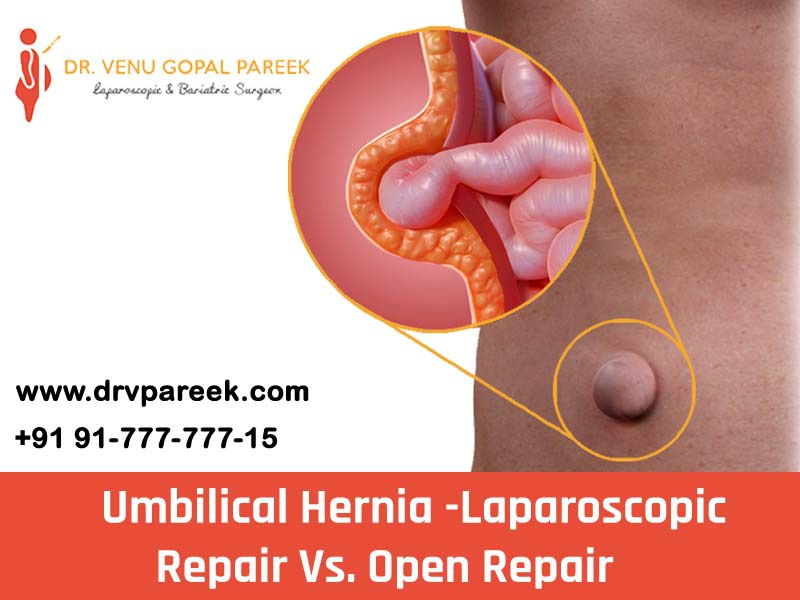
Umbilical hernias do not go away naturally and require medical treatment to repair them and surgery is the only way to repair them.
A hernia occurs when the inside of the body pushes out a weak spot in a muscle or tissue. Most types of hernias develop in adolescents or adults. Umbilical hernias are more common in babies, and 20% of babies are born with one.
When the intestinal loop pushes through the abdominal wall an umbilical hernia occurs near the navel. They can look like outer belly buttons. It is estimated that about 10% of all abdominal hernias are umbilical hernias.
This article gives information about umbilical hernia laparoscopic and open repair.
What do I need to know about umbilical hernia repair?
Umbilical hernia repair is an operation to repair your umbilical hernia. An umbilical hernia can be repaired if the hernia blocks blood flow to the organs, blocks the intestines, or causes pain. An open repair or laparoscopy can be done to repair your umbilical hernia.

How to prepare for umbilical hernia surgery?
Your doctor will inform you about how to prepare for surgery. He will ask you not to eat or drink anything after midnight before the day of your surgery. He will tell you what medicine to take or not on the day of the surgery. You may be given IV antibiotics to prevent bacterial infection. Tell your doctor if you have had an allergic reaction to antibiotics. Make sure someone takes you home and accompanies you after the surgery.
Treatment for umbilical hernias
Umbilical hernia repair surgery will help restore the sac and strengthen the abdominal wall. There are two types of hernia surgery.
Open hernia repair
During this surgery, your doctor makes a small incision near your hernia, and a surgical mesh is placed over the hernia site in the muscle. The mesh strengthens the area to prevent the hernia from returning.
What happens during open recovery from an umbilical hernia?
You will be given general anaesthesia to help you stay asleep and pain-free during the operation. Your doctor will make a large incision near your belly button. It will bring your intestine or tissue back to the right place.
Strong sutures can be used to close the openings in the abdominal wall. The mesh can be used to cover the area. The mesh will help prevent the hernia from recurring. Your doctor can close your incision with sutures, medical glue, or Steri-Strips ™. He can also put a small bandage over the incision.
The operation takes one to two hours. After patients are transferred to the recovery area, they are advised to spend the next two to three days in the hospital. Once you are home, it may take four to six weeks for a full recovery. This type is associated with greater postoperative pain and wound infection, including the possibility of developing a hernia.

Laparoscopic hernia repair
This type of surgery uses mesh or stitches to repair the hernia. The mesh or sutures are attached to a tool that is passed through a small incision in the abdomen.
Your doctor will ask you not to eat or drink anything for six hours before surgery for both types of surgery. You will be under general anaesthesia, and the procedure usually ends in about 30 minutes.
For simple umbilical hernia repair, you may be able to go home the same day of the surgery. However, you should take three to five days off to rest and let your body recover.
After surgery, your pain will be controlled with medication. You may be able to return to normal activities in about a month, but you should avoid anything strenuous for at least two weeks.
What happens during laparoscopic umbilical hernia repair?
You will be given general anaesthesia to help you stay asleep and pain-free during the operation. Your doctor will make a small incision above your belly button. He will insert a laparoscope through this incision. A laparoscope is a long metal tube with a lamp and camera at the end. The doctor places another tool by making 2 to 4 small cuts at various places in your abdomen.It will inflate your abdomen using gas. This will help your doctor better see your hernia.
Your doctor will return the intestine or tissue to its place. A firm suture is used to close the opening in the abdominal wall. The mesh can be used to cover the area. The mesh will help prevent the hernia from recurring. Your doctor can close your incision with sutures, medical glue, or Steri-Strips. He can also apply a small bandage to the incision.

The operation takes about one to two hours after which the patient is then taken to a recovery area. Most patients are discharged from the hospital the same day or the next day of surgery. Once you are home, it will take about a week to recover fully. This type results in less pain, faster recovery, and fewer complications such as infection.
What happens after surgery?
Doctors monitor you until you wake up. You may experience pain, gas, or nausea after the surgery. If you have had a laparoscopic repair, you may experience pain in your shoulder or near your ribs. This is from the gas used during operation. Doctors give you medication for pain and nausea. You may be able to go home if the pain is under control; you can drink fluids and urinate.
Conclusion:
After a detailed comparison of the two procedures, it can be concluded that the laparoscopic method is the most advanced approach in the field of Umbilical hernia treatment. Although laparoscopic surgery is widely used, open surgery is done at times for technical or safety reasons.
You have every right to be fully involved in the planning of the treatment. Learn more about your health and how to treat it. Discuss treatment options with your doctor to help you decide which treatment you want to receive. You always have the right to refuse treatment. The information above is for educational purposes only. It is not intended as medical advice for any individual disease or treatment. Talk to Dr Venu Gopal Pareek before following any surgery related to gastroenterology to make sure it is safe and effective for you. Contact Dr Venu Gopal Pareek at (917) 777-7715.







